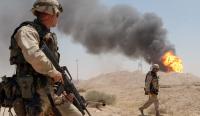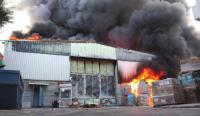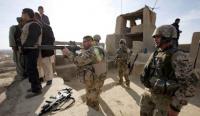The complex war in Syria provides only one alternative: diplomacy. But this solution would be blocked by the geopolitical interests of the U.S. and Russia and arms lobbies. “They are in all senses of the word ‘making a killing’ on this war”. Negotiations would be farcical as long as weapons are flooded into the region and the bombing continues, says Phyllis Bennis. The U.S. and its allies are co-responsible for the chaos in Syria. From Afghanistan to the “liberation of Mossul” stretches the bloody legacy of the failed U.S. foreign policy. The notion that western powers liberate people would be simply a "lie".
Phyllis Bennis, Institute for Policy Studies, Washington D.C.
The war in Syria is complicated, says Bennis. “It is actually at least ten or maybe eleven separate wars, depending on how you count”. That would make it harder compared to other wars “to understand it, to build the kind of opposition that is necessary to push governments, to stop their current style of sending troops to ‘their side’ and then talk about diplomacy, but keeping all the attention, all the money on the military side”. The IS was born in U.S. torture prisons in Iraq. That motivated Sunni generals and tribal leaders angry about the U.S. occupation to joint the Islamist group. “They saw ISIS as a way to fight back.” The IS alone has only a few thousand fighters with not very good weapons. But they get support from many people in the region. That makes them strong.
The war consists of a whole set of regional and international proxy wars that matches both sides of the Syrian civil war. “But we should have no illusions that the U.S. is backing rebel forces against the Syrian regime because it’s worried about the regime's human rights violations”, says Bennis. The U.S. has traditionally depended on the Syrian regime's human rights violations for example in outsourcing interrogation and torture during the so-called war on terror. For Russia Syria is the only remaining Arab ally. The Russian military base at Tartus is the last one outside the former Soviet Union. “There are war crimes on all sides”. Continued fighting is blocking the only existing alternative diplomacy while at this stage no one could “win” the war anymore. The militarization of the conflict has made that impossible. “Even the Syrian resistance will not gain everything that they should have gained from this process”.
As long as major powers like the U.S., Russia and Germany are delivering weapons to their allies in the region “having representatives of the same countries sitting around a table in their nice suits talking about peace isn't going to go very far. (…) So when we hear these things like: ‘Oh we all want to end this war’, ‘No one wants this war’ - It’s an absolute lie! The people who want this war are the people who profit from this war: the arms manufacturers, the military contractors. They are in all senses of the word ‘making a killing’ on this war”. The sanctions against Syria would again hurt the most vulnerable not those in power. The U.S. and other major powers have not learned the lessons from Iraq, says Bennis. The boycott of Iraq in the 90ies is responsible for killing 500,000 children under the age of five.
The countries of the Middle East that have been the subject of wars, whether it's Afghanistan, Iraq, Yemen, Somalia or Libya are “the legacy of failure of U.S. foreign policy. The policy, that claims to be aimed at keeping Americans save from terrorism and bringing democracy to the region has done everything to the opposite”. In Afghanistan, after 15 years of U.S. occupation there are still thousands of troops and tens of thousands of U.S. contractors that flood through the country. It is either the first or second worst country in the world for children's health or maternal mortality. The UN just found out that 42% of the children in Afghanistan have either never gone to school or been forced out of school before the 5th grade. The Bush administration has treated the 9/11 attacks as an act of war not a crime and invaded Afghanistan although the country was not involved in the attacks. Now there is the “Offensive against Mosul”. But in a poll 84% of the city’s residents said: “We don't want to be liberated that way because we are afraid!”. Bennis: “So this notion that we are somehow ‘liberating’ people is simply a lie’”.
There is a clear link between at least low-level Saudi officials to the 9/11 attacks. That part has been known for a long time. What's changing is the attitude in U.S. congress, says Bennis. Because of pressure campaigns by the U.S. anti-war movement congress just passed and in fact overrode the veto of president Obama on a law that says that U.S. citizens who lost family members in 9/11 can sue Saudi Arabia to get information about what involvement they may have had. “That's a huge shift in U.S. policy.” The same has happened with the latest arms deal to Saudi Arabia. “There was a higher level of opposition than we have ever seen before.” It is also known that a lot the money that funds the IS comes from Saudi Arabia while it’s not clear from where exactly. The government of the gulf monarchy could stop that. “For whatever reason they have chosen not to make that move.”
Stability comes from within not from without, says Bennis. "Do no harm", must be the first step. But stopping arms trades and bombings in the Middle East would not be easy. The weapons manufacturers in the United States have one of the most powerful lobbies. A look at the recent refugee crisis shows that a diplomatic solution is urgently needed. 65 million people have fled their homes, among them a lot of Syrians. This “global refugee nation” had even a team at the latest Olympics. “We have to move, that's a message that this is not ok”. In the wake of the crisis, the United States has only taken 10,000 Syrians “and has bragged about it. It’s shameful! My government should be so ashamed!” There was no refugee crisis in the States but a racism crisis, says Bennis. In Europe you could see the beginnings of a crisis. But there has also been a racist backlash. “The effect is new border controls, new border fences, new border police, new border guns”. But Bennis still has hopes for the Middle East. The Arab Spring has started a revolutionary process. A whole generation has said: “Enough. That’s a huge model.”











